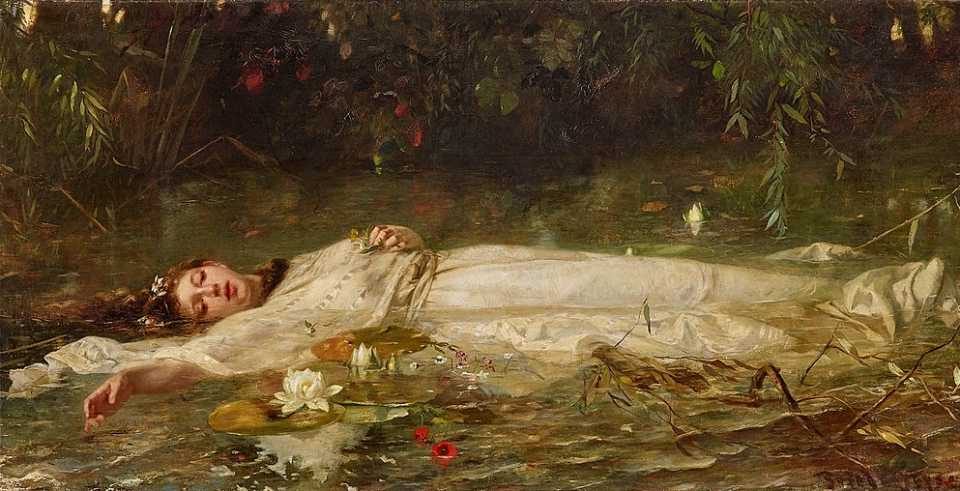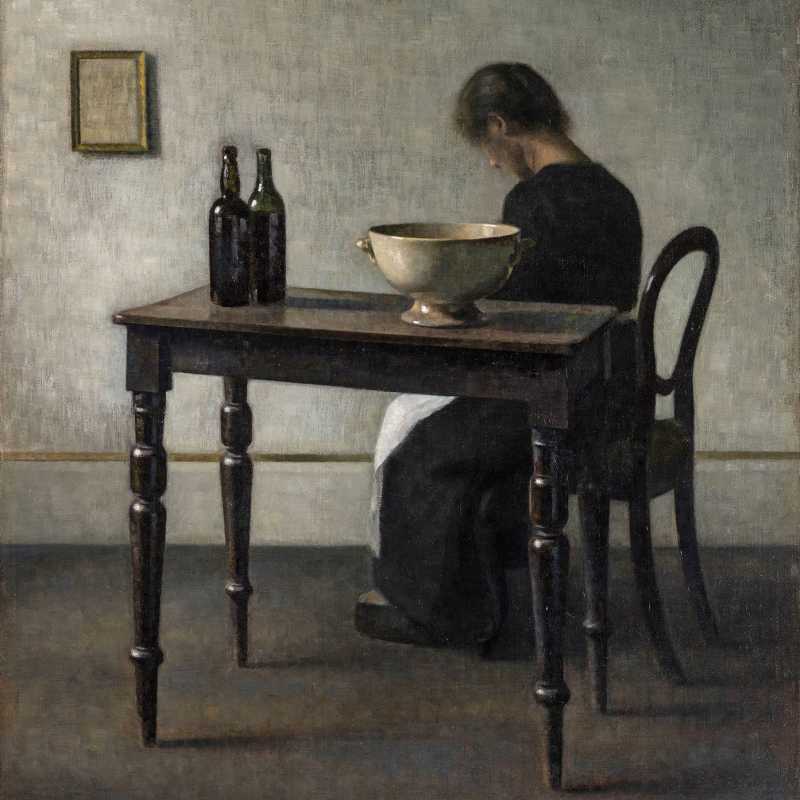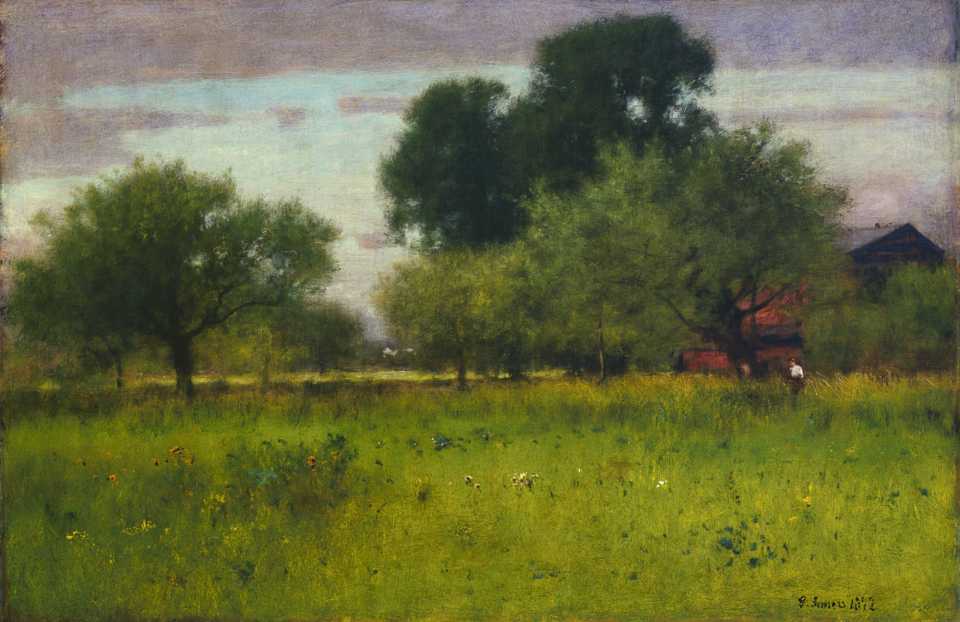Dec 11, 2021

“Ophelia,” oil on canvas, by Friedrich Heyser, n.d.
by Lisa K. Buchanan
The mortician arrived last night, well before the viewing, to paint our little girl pretty. He was not the expected somber-suited officiant, but a bearded hippie with sunglasses and an art background. His former career, a renowned painter of psychedelic album covers, peaked before our girl was born, but he has since created an extensive portrait gallery of women with lush and wavy tresses, clingy drapery over limber angularity, and just enough exposed flesh (well, perhaps more than enough) to titillate. His subjects’ shadowy faces—arsenic-pale, holy and transcendent—approach the next world with beguiling solemnity.
Our girl has chlorinated laps for breakfast, a climbing wall for lunch, and a treadmill for dinner, gripping handlebars her collar bones now resemble. Her legs look storky; her complexion, ghoulish. Meanwhile, her womanly-hipped friends gab over burritos after tacking up posters in dorm rooms.
As a model, she tells us, she has found her niche.
I suppose we ought to take the long view and find some consolation in today’s artiste, because long after the starving and shivering are over, we’ll have our girl’s image framed and hanging in our living room: her bony white shoulders and bony white knees; her skeletal fingers holding a white bouquet; her dark, downward gaze on all who enter; a tribute to the grim, famished figure a painter saw as beauty.
“Career Change” originally appeared in Narrative.

Writings by Lisa K. Buchanan have appeared in Hippocampus, New Letters, Narrative, The Offing, and River Teeth/Beautiful Things. Awards include the Sweet 2020 Flash Nonfiction Contest (winner), The Bristol Short Story Prize (shortlist), and the Fish Short Memoir Prize (honorary mention). She likes The Charleston, black rice with butternut squash, Downward-Facing Dog, and breaking the Rule of Three. She lives in San Francisco. lisakbuchanan.com
Dec 6, 2021

“Interior With Woman Sitting at a Table,” oil on canvas, by Wilhelm Hammershoi, 1910.
by Laurie Marshall
You’ll check the mailbox one last time in case there’s an unexpected windfall waiting to pay the mortgage, or an official announcement that the whole thing was a sick joke or that there’s a new technology that can bring someone back to life just like in the movies and your life is not, in fact, forever changed. Today the mailbox is empty.
But before the mailbox, you’ll drive down the dirt road and away from the house one last time looking to see if there are blackberries on the canes, listening to the crunch of rock under tires through the open windows and inhaling the dust deep into your lungs where you invite it to nestle in, to become thickened and scarred over, visible on x-rays as tiny white dots in otherwise translucent flesh. To become a physical part of you.
But before the drive, you’ll lock the red wooden door one last time and pocket the key that you have no intention of handing over to the man at the bank or the eventual new owners but will, instead, wear on a chain around your neck because it is a literal key to your truth and your personhood and the floor plan of your life up to this point. They’ll change the locks anyway.
But before you lock the door, you’ll say goodbye one last time to the dogwood outside the window over the kitchen sink where you learned to peel potatoes, and the fireplace built of stones warmed by the sun on this land and placed by the hands of your grandfather, and the bathtub where your mother bathed each night before bed and where she landed after the fall that preceded the news that she had a mass in her right parietal lobe. This would explain the question about her sobriety when she was pulled over six months earlier.
But before you say goodbye to the dogwood and the fireplace and the bathtub, you’ll say goodbye to your mother one last time as she lies unconscious and numbed by morphine, her skull leasing space to an assassin that doesn’t care about trees or stones or keys or the agony that its residency is causing and will continue to cause once it, and its host, have stopped breathing and are burned to ashes and blown downriver from the edge of the limestone bluff salted with fossils of creatures that are alive only in our memories and imaginations.

Laurie Marshall is a writer and artist working in Northwest Arkansas. She’s a reader for Fractured Lit and Longleaf Review, and her words and art have been published in Emerge Literary Journal, Versification, Bending Genres, Twin Pies Literary, and Flash Frog, among others. This is her first contest win, but she’ll have a longlisted story published in the Bath Flash Fiction Anthology in December 2021. Connect on Twitter @LaurieMMarshall.
Dec 2, 2021

“Orpheus in the Underworld,” oil on copper, by Jan Brueghel the Elder, 1594.
by Kathleen Rooney
Down
This day could use the excitement of receiving a surprise package. Even better if that package reads THIS SIDE UP.
Don’t tell me to take this frown and turn it upside down; it’s my frown and I can do what I want.
I went to high school in Downers Grove, founded in 1832 by Pierce Downer. I have zero knowledge of his temperament, but I hope that his surname becoming an eponym cheered him.
Would you find it odd if I asked you to sit down and talk about the existence of God? It would serve me well to know the meaning of hell. I will tell you, “Wow, that’s so deep.” And you will say, “Let me break it down.”
Astrologers down the ages have lain down on the ground to study a patch of sky from below, their lore passed down by word of mouth.
If you need to calm down, try running up and down the stairs. Pacing up and down the room. Walking down to the lake.
You look ravishing, darling, with your hair down like that.
D.W. Griffith was racist and a mess as a director, but I watched all two hours and 27 minutes of Way Down East just to gaze at Lillian Gish and Richard Barthlemess.
A neutral adverb, “down” gets placed in a lot of masculine contexts: gridiron football and its countless dull downs. He downed that whole six-pack like an enemy aircraft. Okay, you’re a man, we get it, settle down.
A massive dude parks his blue pickup truck on the corner, radio blaring a country station. I want to yell out the window, “Hey buddy, turn it down!” But I’m afraid he’d gun me down.
Riding high from her sleeper hit Mean Girls, Lindsay Lohan was the host of Saturday Night Live the night Rachel Dratch premiered the character Debbie Downer. From the heights of fame the only place to go is down.
Hey babe, while you’re up, can you pull down the shade? While you’re at it, can you burn down the patriarchy?
The minor third interval of the Sad Trombone consists of four descending notes. A plunger mute helps, because a soupçon of comedy is the quintessence of failure.
Thinking about down comforters really brings the ducks down.
The emotional impact of the statement “the system is down” hinges entirely upon the system in question.
Death can be such a lofty concept that it helps to bring it down to earth, like: how many miles of toilet paper will I have used in my lifetime?
It’s getting down to the wire for the human race. But there’s always time to get down on the dance floor.
I’ll drink to that—down the hatch.
*
Can
The Little Engine that Could began as a sermon. I haven’t read it in a while. Does it hold up? Is it any good? Can we agree that optimism and hard work have their limits?
Congress can declare war. But Congress shouldn’t.
I cannot even with America right now.
Growing up in rural Nebraska, one of seven kids in a family that couldn’t afford a piano, my dad played the accordion. His favorite piece was Jacques Offenbach’s “Can-Can.” I can picture him—rambunctious, bumptious—cantering around, booming the tune until his own dad cantankerously told him to can it.
That canny physical and metaphysical resonance whenever I say, “Can you open this can?”
Keep that up and you’re going to get canned. But maybe getting canned is not the worst that can happen.
“I-think-I-can-I-think-I-can”—I’m a capitalist subject, so of course I’m meant to think that.
Extravagant postures, lascivious gestures—as dances go, the can-can is hysterical. The song’s real name is “Galop infernal,” devised for the final act of Orpheus in the Underworld, meant to evoke drunken gods partying in hell. It captures that well. Risqué high kicks! Splits! Cartwheels!
A can of peaches, a can of ability. Can you really eat that whole can of beans?
To conclude her can-can, La Goulue bent over and tossed her skirts over her back to reveal the heart embroidered upon the seat of her underwear. This move came to be known as “the derrière.”
Almost nothing actually comes in a tin can. You probably mean aluminum.
Everything money can buy and everything money can’t. You can’t drink oil. You can’t eat profits.
He locked himself in the can and refused to come out. I hope that the cops never throw you in the can.
My high school speech team mentor Melissa got me a coffee mug that said If you can believe it, you can achieve it. She bought it from a shop in the mall called Successories. Commodity fetishism at its suburban peak, but in my head, I started telling myself stories about winning anyway. Then guess what? I did.
Physically or mentally able, indicative of possibility. Maybe every elected official needs a kick in the can.
You can go now if you like.
Rapturous, sublime, and over in 2 minutes and 11 seconds’ time, here’s hoping they play “Can-Can” at the end of the world. Can you imagine?
*
Rain
Rain again. Does that rhyme when you say it?
Gray clouds gauze the wounded sky. Peculiar beauties in a heaven full of specimens!
Luke Howard taxonomized in his “Essay of the Modifications of Clouds”: cirro-form from Latin for curl of hair, cumulo for pile, strato for layer, and nimbo for rain. Goethe, beset with an almost painful admiration, popularized these classifications in a poem: “My winged song thanks / the man who distinguished cloud from cloud.”
I bless the rains down in Africa—I love that stupid song.
Acid rain corrodes my dreams like statues. Rain of terror in an era of global weirding.
Clouds cover 2/3 of the planet at any moment, but as the Earth warms these clouds become scarcer. Fewer surfaces reflecting the sun back to space means the Earth gets even warmer, which leads to even fewer clouds. Tufts brushed aside like cotton from a bottle.
Thunder gallops across the sky, but the earth remains dry. My kingdom for some rain!
A reign usually lasts until the monarch dies. Will humans abdicate? Will we be deposed? The monarch butterflies are dying.
A headline in Scientific American last month: “Eight States are Seeding Clouds to Overcome Megadrought.” Though little evidence shows that the process increases rain.
Maybe if we wrest the reins of government from corporations? Maybe if we give free rein to our imaginations? We must keep a tight rein on spending, we’re told.
Each plasma cell in the sun is about the size of Texas. Useless to know, perhaps, but morbidly fun.
In The Merchant of Venice, Portia says, “The quality of mercy is not strained; / It droppeth as the gentle rain from heaven / Upon the place beneath. It is twice blessed; / It blesseth him that gives and him that takes.” We’ve taken too much. It’s too late to correct our mistakes.
The golden sun, a timepiece overhead, counting us down.
A Kurt Schwitters poem in its entirety: “When I am talking about the weather / I know what I am talking about.” That was what, a hundred years ago?
A glissando of rain gives way to the pecking beaks of pizzicato violins. The soundtrack indicates the nearing of the end.
I don’t even know anymore.

Kathleen Rooney is a founding editor of Rose Metal Press, a nonprofit publisher of literary work in hybrid genres, as well as a founding member of Poems While You Wait. Her most recent books include the novel Lillian Boxfish Takes a Walk (St. Martin’s Press, 2017) and The Listening Room: A Novel of Georgette and Loulou Magritte (Spork Press, 2018). Her World War I novel Cher Ami and Major Whittlesey was published by Penguin in August, and her criticism appears in The New York Times Magazine, The Poetry Foundation website, The Chicago Tribune, The Brooklyn Rail, The Los Angeles Review of Books, and elsewhere. She lives in Chicago.
Nov 23, 2021

“Apple Orchard,” oil on canvas, by George Inness, 1892.
by Annette Sisson
Autumn crisps the tapering light,
oak pulls on its auburn duster.
We drive beside the river to the steep
orchard where apple trees climb
the furrowed ridge. In fall we recall
how the tang of applesauce, as native
and ardent as old marriage, staves off
winter’s crisis of ice. En route
we wonder: Will the bent woman
still be there? Or will she have joined
the earth somewhere between hollow and hill?
You find the crack in the dell, nose
our car down the dirt drive.
Through the shack’s murky window
we see her dark form move.
She opens the unsprung door,
offers her creaky smile; we hunch
inside, hair dusting the low
lintel, breathe in apples,
ask for Mullins—Rusty Coats,
she mumbles, loads them into bushel
baskets; we hand her folded cash,
lug the haul to the trunk, nod,
a shadow waving, pull away.
Down the road the Caney Fork.
We glimpse fishermen, their waders and gear.
You cut the engine. I choose to wait
on the bank, you follow the cascades,
navigate the jagged rocks half-way
across, and beyond, noting the river’s
level, the anglers’ netted catch.
I watch a heron stalk, dive,
swallow a small bream. The bird
ruptures the air as it rises, marks
time in high breeze, finds
the tree line’s gap, disappears
over the bluff. I blink, scan
for your silhouette, framed in a plot of sun
against cliffs where river widens, sky
opens. You are a shade dancing
in light, a paper figure flitting
on wire. I picture the wire thickening
to rope, me pulling your body,
hand over hand, back to shore.
The retreating beats of the bird’s
wings echo. I think of the apple
woman, dilapidated shed, pungent
harvest—the honeyed zest of my mother’s
apple tart, her ashes strewn
under a broad maple last January.
I want to hear you breathe,
slide my fingers through your arms,
lock them between the shoulder blades.
Distance and time, a heron’s flight—
its absence, perhaps its return. I want
to glide across that stretch of miles
back to the grizzled woman sorting
fruit, to catch her rusty voice,
see her wave us off, the sleeves
of her blowsy jacket fanning the wind.
Distance, time, what we bear,
a winter sharp with apples.

Annette Sisson has poems published or forthcoming in Nashville Review, Typishly, The West Review, HeartWood Literary Magazine, Sky Island Journal, and many others. Her first full-length book, Small Fish in High Branches, is forthcoming from Glass Lyre Press. Her chapbook, A Casting Off, was published by Finishing Line in 2019. She was named a 2021 Mark Strand Poetry Scholar for the Sewanee Writers’ Conference, a 2020 BOAAT Writing Fellow, and winner of The Porch Writers’ Collective’s 2019 Poetry Prize. Visit her website at annettesisson.com.
Nov 18, 2021

“Wildflowers and Mushrooms in a Woodland Setting,” oil on canvas, by Franz Xaver Petter, 1857.
by Scudder Parker
The peonies and gladiolas are more
seductive every fall. I choose slips
of peony root with three buds full
of color that may prosper years from now.
I dig shaggy gladiola corms,
plumped on slender stalks, next year’s
replacements for the tough exhausted husks
left from the thrust of color-trumpets to the sky:
purple (steeped in black), regal crimson,
slim white Abyssinian, lavender
that cried out to sunset orange;
bulblets cling, intent on futures of their own:
Beauty’s nonchalant kindness
accepts the slow learning of my eyes.
A few days of October sun—they seem
like gratitude, always a surprise.
I plant the slips; come in and sort the corms;
possessed by past and future blooms.
I remember how I dreaded
grownups who creaked like closing doors.
Even now I fear joy might never
be allowed back through my window,
but gratitude’s a different eye that opens—
unnerving in its great permissions.
In sun, on this cold porch, I’m grateful.
Some shy part of me is always
sitting here, no wisdom, no plan; full
of psalms, no notion who I’m singing to.

Scudder Parker’s work has appeared in The Sun, Vermont Life, Northern Woodlands, Passager, Eclectica Magazine, and elsewhere. His first volume of poetry, Safe as Lightning, was released in 2020 by Rootstock Publications.








